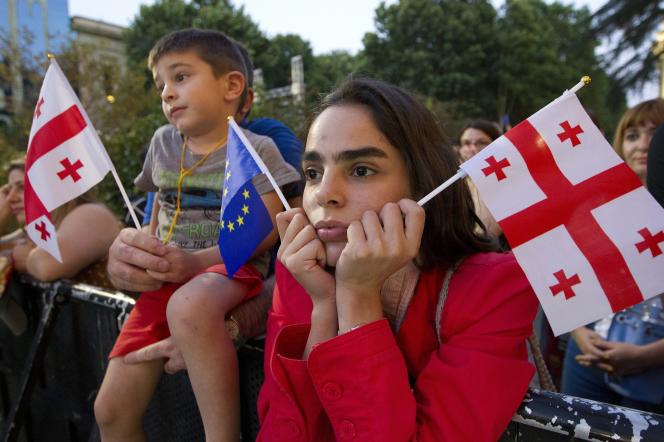Two weeks after a first mobilization on June 21, there were again tens of thousands of pro-European activists to demonstrate on Sunday July 3 in Tbilisi to demand the resignation of the Georgian government, accused of having failed to obtain the status of candidate for the ‘European Union.
In the evening, more than 35,000 demonstrators gathered outside the Georgian parliament, blocking traffic on the capital’s main artery and waving European and Georgian flags, as well as “We are Europe” signs, journalists noted. from Agence France Presse (AFP).
All opposition parties and several pro-European organizations had called for demonstrations to increase pressure on the ruling party, Georgian Dream, accused of authoritarian drift and of having deteriorated relations with Brussels. “We demand that the oligarch Bidzina Ivanishvili (founder of the Georgian Dream) relinquish executive power and transfer it, respecting the Constitution, to a national unity government,” they had called in a message on Facebook before the demonstration. A new government must “carry out the reforms requested by the EU and which will automatically bring us candidate status for EU membership”, the text continues.
“Undemocratic” system
For one of the demonstrators, surgeon Nika Gorgaslidze, 45, “Ivanishvili pulls the strings of the government, of parliament, of the courts, of the media: it is a system which is not democratic and which is incompatible with the Georgia’s goal of becoming a member of the EU”. “Our protests will not stop until we have a new government capable of implementing the reforms needed to become an EU member,” said Marina Sanodze, a 19-year-old student.
On June 23, European leaders said they were “ready to grant candidate status” to Georgia, the target in 2008 of a Russian armed offensive, but once significant reforms have been carried out. This decision was followed by demonstrations against the Georgian Dream, during which it was demanded that Bidzina Ivanishvili, considered the strongman of the country, even if he no longer has an official political function, let go of power.
Georgia, which borders the Black Sea, applied to join the EU along with Ukraine and Moldova, two other former Soviet republics, days after Russia attacked Ukraine on 24 february. But while European leaders have granted this status to Kyiv and Chisinau, they have denied it to Tbilisi, while recognizing Georgia’s “European perspective”. “Georgia’s future is within the EU,” assured European Council President Charles Michel.
“Mobilized” Government
The announcement was hailed as “historic” by Georgian President Salome Zurabishvili. “We are ready to work with determination over the next few months to achieve candidate status,” she wrote on Twitter.
But Brussels is asking Tbilisi for reforms to strengthen justice, freedom of the press, the electoral system, and fight against the oligarchs, in a country regularly shaken by political crises. Prime Minister Irakli Garibachvili, of the Georgian Dream party, assured that his government was “mobilized” to carry out these reforms and obtain candidate status “as soon as possible”.
Georgia has wanted to join the EU and NATO for years. Against the background of these ambitions, a short war opposed it in 2008 to Russia, which immediately recognized the independence of two Georgian separatist territories.

















